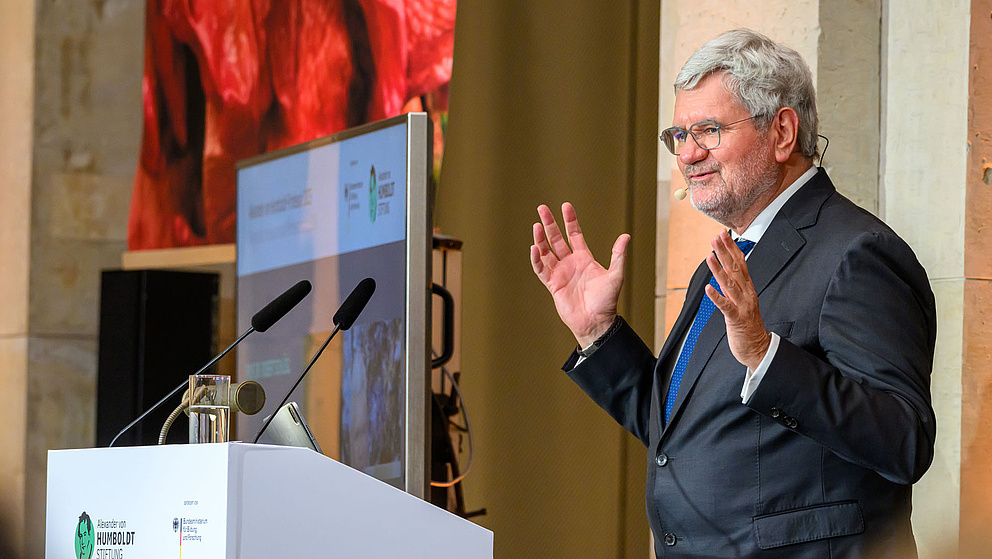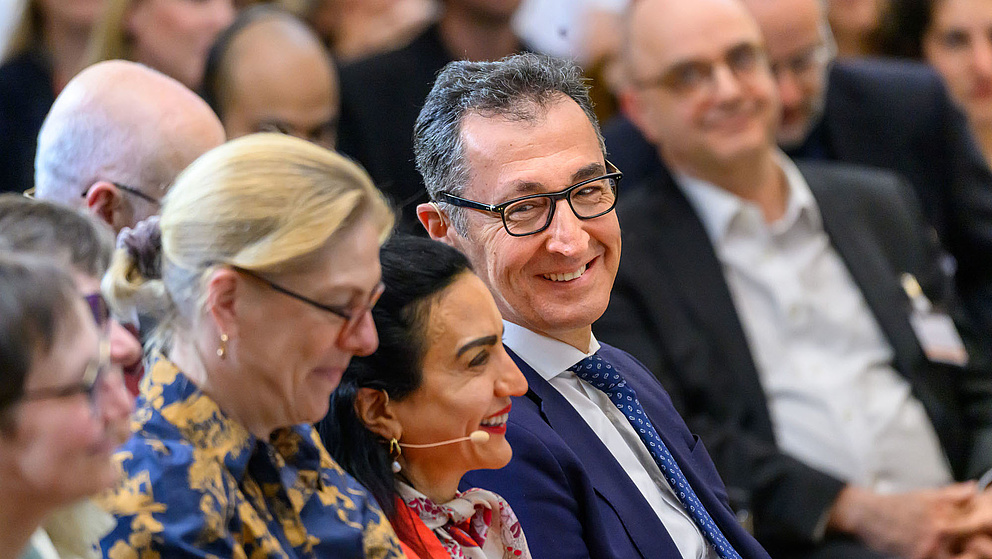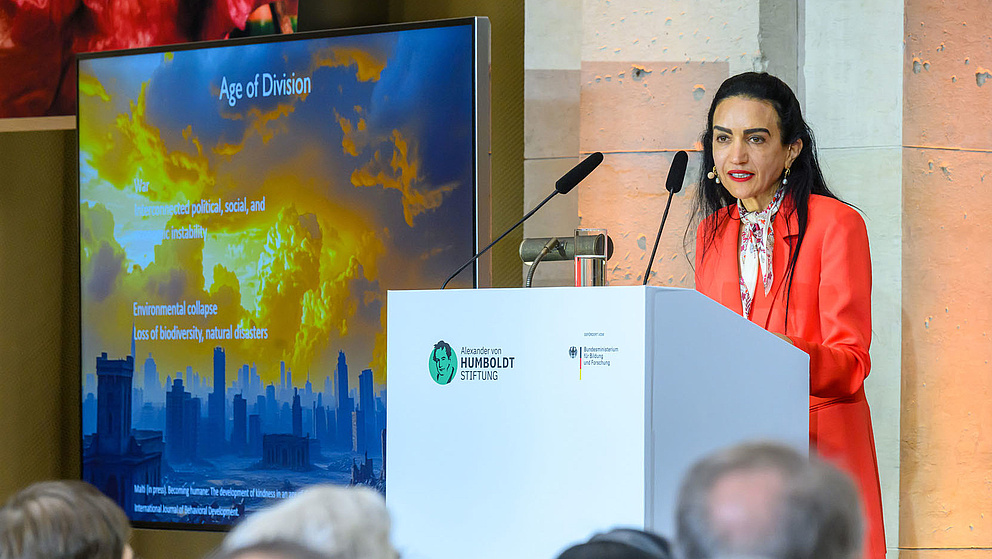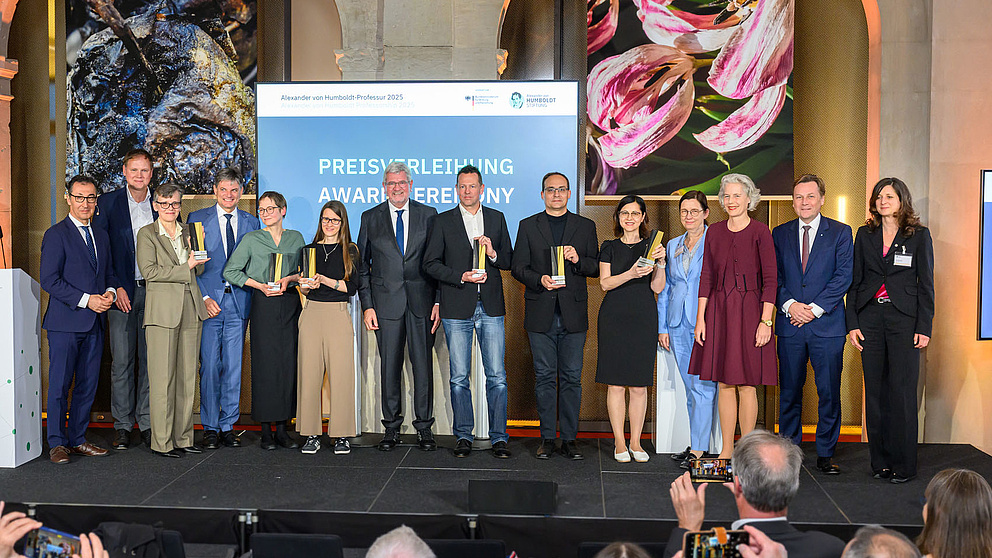Jump to the content
- {{#headlines}}
- {{title}} {{/headlines}}
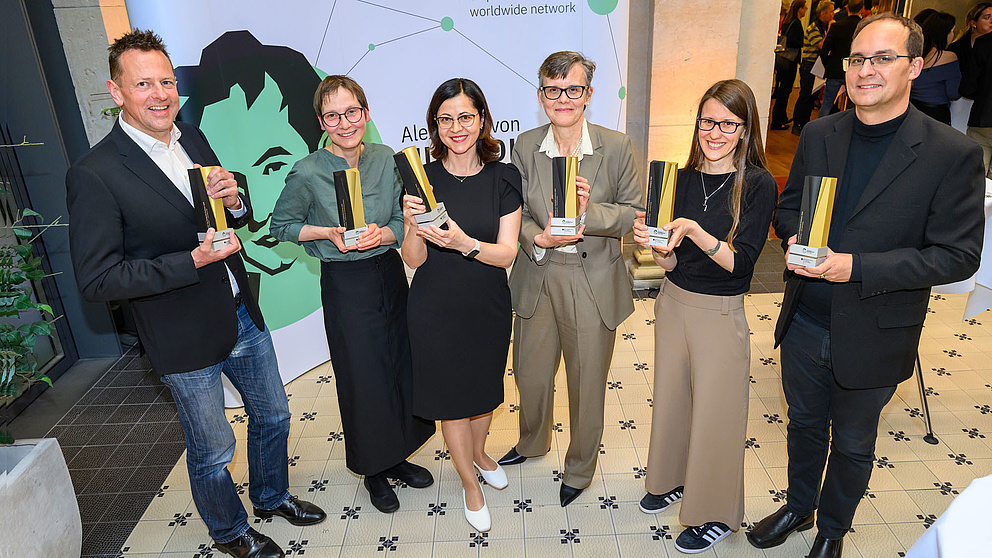

Contact
Press, Communications and Marketing
Tel.: +49 228 833-144
Fax: +49 228 833-441
presse[at]avh.de
Federal Minister of Education and Research Cem Özdemir and the President of the Alexander von Humboldt Foundation, Robert Schlögl, presented the Alexander von Humboldt Professorships in Berlin on Monday evening. The six new Humboldt Professors were nominated by German universities and will be moving from abroad to Cologne, Duisburg-Essen, Erlangen-Nuremberg, Hamburg, Leipzig und Potsdam. Alexander von Humboldt Professorships each come with €5 million in funding for individuals conducting experimental research and €3.5 million for researchers working in theoretical fields.
Restricting science to one nation just won’t work.
A Humboldt Professorship brings freedom
In his speech, Humboldt Foundation President Robert Schlögl referred several times to the situation of universities and science in the USA. The last several months have constituted an unprecedented turning point. The research community has been stunned by previously inconceivable assaults on academic and scientific freedom. “The Trump administration is declaring war on worldwide leading universities. This is something we cannot ignore – we are all affected by this. The threat here is not only to the world’s strongest and best science system. Trump’s actions are endangering science and prosperity worldwide”, Schlögl noted.
“In difficult times, we all – the political sphere, funding organisations and universities and research institutes – have a responsibility to individually support researchers and keep scientific freedom alive in order to enable independent research” because after the loss of freedom in science comes the loss of freedom in society, said Schlögl. The Alexander von Humboldt Professorship offers freedom to conduct research without programmatical fetters – something that, it might be argued, is currently “more important than the highest amount of funding”, he added.
Support needed for researchers from the USA
With the aim of helping researchers from the USA, Schlögl made the following offer: “When we receive corresponding financial support, the Humboldt Foundation can sponsor more top researchers, offer them a temporary haven and afford them job opportunities. Not to woo away the best of the best, but to build strong networks of trust and to foster brain circulation wherever it is possible.”
Schlögl underscored that research lives from the exchange of information and ideas. Hypotheses and ideas have to be continually examined and refined, he said, adding “Restricting science to one nation just won’t work”.
Restrictions on freedom of science are restrictions on democracy itself.
Freedom of science is a pillar of democracy
The Federal Minister of Education and Research Cem Özdemir also emphasised the importance of scientific freedom: “With the Alexander von Humboldt Professorship, the most valuable international research award in Germany, we are recognising outstanding researchers who stand for excellence and international exchange. With this award we acknowledge their impressive achievements and express our deep confidence that they will continue to push the boundaries of knowledge in the future as well. In other words, with this award we are fostering individuals, not projects – and we are doing this without any expectation of short-term benefits. This is because science needs this freedom – to maintain its own diversity and to advance social and economic progress. In Germany, freedom of science is anchored in the constitution; it is a pillar of democracy. Restrictions on freedom of science are restrictions on democracy itself. In times when scientific freedom is coming under pressure around the world, we are stressing: we can and want to offer scientific freedom in the German science system for researchers who no longer have the opportunity to work freely in their own countries.”
The Alexander von Humboldt Professorship
The Alexander von Humboldt Professorship brings top international researchers from abroad to German universities. It is financed by the Federal Ministry of Education and Research. The award offers optimal financial conditions and maximum flexibility for conducting leading-edge research in Germany. In addition to the candidates’ outstanding scientific and academic qualifications, a deciding factor in the selection process are the concepts developed by the universities that will offer the researchers and their teams long-term career prospects in Germany.
Information regarding all of this year’s Humboldt Professors is available here. Photos from the ceremony and related videos can be downloaded from the dossier page of the respective award winner.
Recipients of an Alexander von Humboldt Professorship:
- Dana Branzei, Molecular Biology, is switching from the Institute of Molecular Oncology in Milan, to the University of Duisburg-Essen.
- Daniel Kráľ, Mathematics/Computer Science, is switching from the University of Brno to Leipzig University and the Max Planck Institute for Mathematics in the Sciences.
- Ingrid Piller, Sociolinguistics, is switching from Macquarie University in Sydney to the University of Hamburg.
- Eva Pils, International Public Law, has been switching from King’s College London to Friedrich-Alexander-Universität Erlangen-Nürnberg (FAU).
- Andreas Winter, Quantum Communication, is switching from the Universitat Autònoma de Barcelona to the University of Cologne.
Alexander von Humboldt Professor for Artificial Intelligence:
- Sandra Wachter, Law, is switching from the University of Oxford to the University of Potsdam/Hasso Plattner Institute.
Every year, the Alexander von Humboldt Foundation enables more than 2,000 researchers from all over the world to spend time conducting research in Germany. The Foundation maintains an interdisciplinary network of well over 30,000 Humboldtians in more than 140 countries around the world – including 63 Nobel Prize winners.

